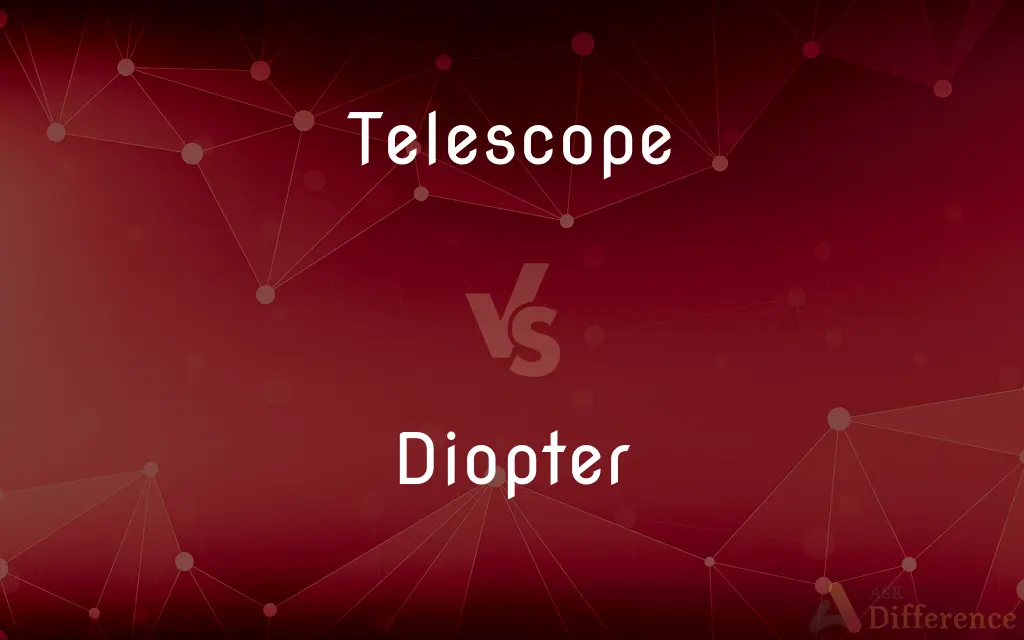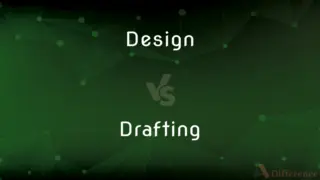Telescope vs. Diopter — What's the Difference?
By Tayyaba Rehman — Updated on October 30, 2023
A telescope is an optical instrument for viewing distant objects, while a diopter is a unit of measurement for the optical power of lenses.

Difference Between Telescope and Diopter
Table of Contents
ADVERTISEMENT
Key Differences
A telescope is an optical device designed to make distant objects appear nearer and more detailed, using lenses or mirrors. In contrast, a diopter is a unit of measurement used to express the refractive power of lenses.
Telescopes come in various types, including refracting, reflecting, and compound, each using different optical principles. Diopters, on the other hand, are used in the context of optics, particularly in eyeglasses and camera lenses, to denote their focusing strength.
The purpose of a telescope is observational, allowing users to see distant celestial or terrestrial objects. The concept of diopters is more technical, indicating how much a lens can bend light.
When discussing telescopes, terms like magnification, aperture, and focal length are common. In discussions about diopters, you'll encounter terms like focal power, myopia, and hyperopia, relating to vision correction.
The history of telescopes traces back to the early 17th century, linked to figures like Galileo. Diopters as a measurement have a more medical and scientific origin, rooted in understanding and correcting vision.
ADVERTISEMENT
Comparison Chart
Nature
Optical instrument
Unit of measurement
Purpose
Viewing distant objects
Measuring optical power of lenses
Types
Refracting, reflecting, compound
Not applicable
Usage Context
Astronomy, terrestrial observation
Optometry, lens-making
Associated Terms
Magnification, aperture, focal length
Focal power, myopia, hyperopia
Compare with Definitions
Telescope
A device using an arrangement of lenses or mirrors to gather light and bring it to focus, magnifying images.
The astronomer set up his telescope to view the meteor shower.
Diopter
A measure of refractive error in vision, used in the manufacturing and prescription of corrective lenses.
After the eye exam, the optometrist determined his diopter value.
Telescope
An apparatus to observe objects at a distance, employing a combination of lenses or curved mirrors.
They donated a powerful telescope to the local observatory.
Diopter
A term in optometry representing the refractive power of a lens, indicating its capacity to converge or diverge light.
She needed contact lenses with a higher diopter for her nearsightedness.
Telescope
A tool for magnified viewing of celestial bodies, such as stars, planets, and galaxies.
He adjusted the telescope to get a better view of Saturn's rings.
Diopter
A unit denoting the correction strength required in a lens to bring distant objects into sharp focus.
The binoculars had a diopter adjustment ring to accommodate each user's vision.
Telescope
An optical instrument to make distant objects appear closer and larger, used in astronomy and terrestrial viewing.
Through the telescope, the distant ship became visible.
Diopter
A unit of measurement of the optical power of a lens or curved mirror, equal to the reciprocal of its focal length in meters.
His eyeglasses were prescribed with a diopter of +2.50 for reading.
Telescope
A telescope is an optical instrument using lenses, curved mirrors, or a combination of both to observe distant objects, or various devices used to observe distant objects by their emission, absorption, or reflection of electromagnetic radiation. The first known practical telescopes were refracting telescopes invented in the Netherlands at the beginning of the 17th century, by using glass lenses.
Diopter
A metric unit used to describe the focusing strength of lenses, especially in eyewear and cameras.
The camera lens had a diopter adjustment feature for clearer focus.
Telescope
An arrangement of lenses or mirrors or both that gathers light, permitting direct observation or photographic recording of distant objects.
Diopter
A unit of measurement of the refractive power of lenses equal to the reciprocal of the focal length measured in meters.
Telescope
Any of various devices, such as a radio telescope, used to detect and observe distant objects by their emission, absorption, or reflection of electromagnetic radiation.
Diopter
A unit of measure of the power of a lens or mirror, equal to the reciprocal of its focal length in meters. Myopia is diagnosed and measured in diopters.
Telescope
To cause to slide inward or outward in overlapping sections, as the cylindrical sections of a small hand telescope do.
Diopter
The dioptre adjustment mechanism of a pair of binoculars or of a camera viewfinder.
Telescope
To make more compact or concise; condense.
Diopter
A lens element attached to the front of a photographic lens to shorten the lens's minimum focus distance; also called a "close-up filter".
Telescope
To slide inward or outward in or as if in overlapping cylindrical sections
A camp bucket that telescopes into a disk.
Diopter
(obsolete) Any lens system, such as a telescope.
Telescope
A monocular optical instrument that magnifies distant objects, especially in astronomy.
Diopter
(obsolete) A theodolite or similar surveyor’s angle measuring device.
Telescope
Any instrument used in astronomy for observing distant objects (such as a radio telescope).
Diopter
(obsolete) An alidade.
Telescope
(television) A retractable tubular support for lights.
Diopter
(obsolete) A surgical speculum.
Telescope
(ambitransitive) To extend or contract in the manner of a telescope.
Diopter
(obsolete) An instrument for drawing the skull by projections.
Telescope
(ambitransitive) To slide or pass one within another, after the manner of the sections of a small telescope or spyglass.
Diopter
An optical instrument, invented by Hipparchus, for taking altitudes, leveling, etc.
Telescope
(intransitive) To come into collision, as railway cars, in such a manner that one runs into another.
Diopter
A unit of measurement of the refractive power of a lens which is equal to the reciprocal of the focal length measured in meters
Telescope
To collapse, via cancellation.
Telescope
An optical instrument used in viewing distant objects, as the heavenly bodies.
Telescope
To slide or pass one within another, after the manner of the sections of a small telescope or spyglass; to come into collision, as railway cars, in such a manner that one runs into another; to become compressed in the manner of a telescope, due to a collision or other force.
Telescope
To cause to come into collision, so as to telescope.
Telescope
To shorten or abridge significantly; as, to telescope a whole semester's lectures into one week.
Telescope
Capable of being extended or compacted, like a telescope, by the sliding of joints or parts one within the other; telescopic; as, a telescope bag; telescope table, etc.; - now more commonly replaced by the term telescoping.
Telescope
A magnifier of images of distant objects
Telescope
Crush together or collapse;
In the accident, the cars telescoped
My hiking sticks telescope and can be put into the backpack
Telescope
Make smaller or shorter;
The novel was telescoped into a short play
Telescope
An instrument for observing distant objects by their emission, absorption, or reflection of electromagnetic radiation.
She gazed through the telescope to observe the moon's craters.
Common Curiosities
What is a telescope primarily used for?
A telescope is primarily used for viewing distant celestial and terrestrial objects.
In what field is diopter a crucial measurement?
Diopter is a crucial measurement in optometry and lens-making.
What does a diopter measure?
A diopter measures the optical power of lenses.
Can telescopes be used for stargazing?
Yes, telescopes are commonly used for stargazing and observing celestial events.
Are there different types of telescopes?
Yes, there are refracting, reflecting, and compound telescopes.
Can diopters indicate myopia or hyperopia?
Yes, diopters can indicate the degree of myopia (nearsightedness) or hyperopia (farsightedness).
Can telescopes be used for terrestrial viewing?
Yes, telescopes can be used for both celestial and terrestrial viewing.
What is the historical significance of telescopes?
Telescopes have been significant in astronomical discoveries since the early 17th century.
Is diopter related to vision correction?
Yes, diopter is closely related to measuring and correcting vision errors.
What does a diopter value indicate in eyeglasses?
A diopter value in eyeglasses indicates the focusing strength of the lenses.
Do telescopes magnify images?
Yes, telescopes magnify distant images to make them appear closer and larger.
Are diopters used in camera lenses?
Yes, diopters are used in camera lenses for focusing adjustments.
Does a higher diopter mean stronger lenses?
Yes, a higher diopter value means stronger lens power for focusing.
What are key terms associated with telescopes?
Key terms associated with telescopes include magnification, aperture, and focal length.
Is learning to use a telescope difficult?
Learning to use a telescope can be straightforward, but mastering its use for detailed astronomical observation takes practice.
Share Your Discovery

Previous Comparison
Design vs. Drafting
Next Comparison
Maltose vs. IsomaltoseAuthor Spotlight
Written by
Tayyaba RehmanTayyaba Rehman is a distinguished writer, currently serving as a primary contributor to askdifference.com. As a researcher in semantics and etymology, Tayyaba's passion for the complexity of languages and their distinctions has found a perfect home on the platform. Tayyaba delves into the intricacies of language, distinguishing between commonly confused words and phrases, thereby providing clarity for readers worldwide.
















































